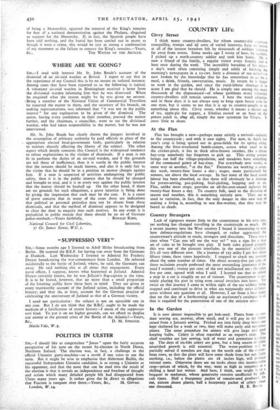At the Flax Flax has brought a new—perhaps more strictly
a revived—industry to the countryside ; and with it new sights. For now, in April, last year's crop is being spread out in grass-fields for its spring airing. Among the frost-weathered bomb-craters, across what used to be the cricket-pitch, it lies in- thick olive-brown swathes, like a dream hay-crop somebody has forgotten to pick up. This airing process brings out half the village-population, and meadows have something of the communal gaiety of hay-time. For everybody now works, in some way or another, "at the flax." Factories are working a seven- day week, twenty-four hours a day ; wages, more particularly for women, are above the local average. In fact most of the local casual labour has been absorbed, so that there will obviously be a shortage for potato-setting, pea-picking, fruit-picking, hopping and so on. Flax, unlike most crops, provides an all-the-year-round industry for twenty-four hours a day. To country folk, used to the dictation of season and weather, this is something entirely new. They are so used to variation, in fact, that the only danger in this new way of making a living is, according to one flax-worker, that they may be bored to .death.


























 Previous page
Previous page